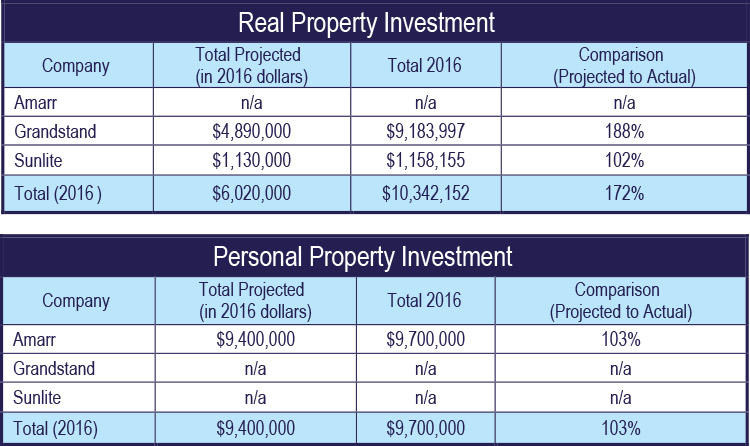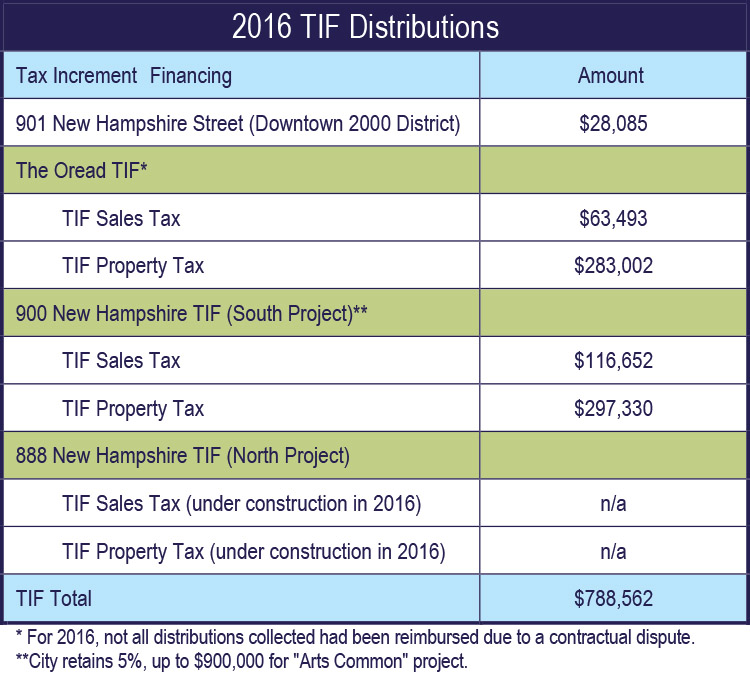City of Lawrence: GASB STANDARDS
Lawrence Ahead of Curve With GASB Standards
| 2017 Q2 | story by Britt Crum-Cano, Economic Development Coordinator, City of Lawrence
 Each year, the City of Lawrence publishes a comprehensive annual economic development report for review by the City Commission. This year, for the first time, standards are in effect that require state and local governments to provide reporting for tax-abatement incentives. These standards have been established by the Governmental Accounting Standards Board (GASB).
Each year, the City of Lawrence publishes a comprehensive annual economic development report for review by the City Commission. This year, for the first time, standards are in effect that require state and local governments to provide reporting for tax-abatement incentives. These standards have been established by the Governmental Accounting Standards Board (GASB).Lawrence is way ahead of the curve, having published a comprehensive economic development report that surpasses the GASB requirements since 2011.
The 2016 Annual Report: Economic Development Support and Compliance, reviews the annual performance of economic development programs, participating projects and the public funds distributed for them during the year. In addition to city contributions, a summary of county-only economic development programs is also included.
 Report highlights include four 2016 property tax-abatement projects that met all compliance requirements, delivering:
Report highlights include four 2016 property tax-abatement projects that met all compliance requirements, delivering:• 72% more real property capital investment than projected ($6 million projected, $10.3 million delivered)
• 3% more personal property investment than projected ($9.4 million projected, $9.7 million delivered)
• 162% more full-time jobs than projected (142 projected, 372 created)
• 24% higher wages than projected ($32,094 projected, $39,802 paid)
• average wages $8,480 higher than the private community wage
• average wages $13,594 higher than the community wage floor
In addition, these property tax-abatement projects paid $194,837 in property taxes out of a total $341,955 due in 2016 ($147,117 abated).
Of the city’s seven authorized Neighborhood Revitalization Areas (NRA), five were eligible for rebates, with rebates totaling $110,300 for 2016. After rebates, taxing jurisdictions realized an average of 18.6% more real property tax revenues in 2016 compared to if these five properties had been left in original condition.
Nine companies had Industrial Revenue Bonds (IRB) in 2016, the majority of which were not affiliated with a property tax abatement but, rather, were utilized to obtain a sales tax exemption on project construction materials.
The city continues to support three Tax Increment Financing (TIF) districts and three Transportation Development Districts (TDD).
• Downtown 2000 TIF—funds 10th and New Hampshire city-owned parking garage
• Oread TIF and TDD—partial reimbursement for public and transportation improvements related to The Oread Hotel project
• Ninth and New Hampshire TIF & TDD—partial reimbursement for public and transportation improvements in South Project area (Hotel) and North Project area (mixed-use)
• Free-State (Bauer Farm) TDD—partial reimbursement for transportation improvements in Free-State development area
TIF distributions were approximately $788,600, and TDD distributions were approximately $278,700 in 2016. (Not all amounts distributed for The Oread project were reimbursed in 2015 and 2016 because of a contractual dispute.)
 Overall, 2016 PAYGO (pay as you go) programs provided approximately $4.69 in private-sector capital investment for each $1 of public-sector assistance provided.
Overall, 2016 PAYGO (pay as you go) programs provided approximately $4.69 in private-sector capital investment for each $1 of public-sector assistance provided.In addition to the PAYGO programs, the report also reviews direct public support provided for economic development services and projects, including grants, loans, capital investment, operations funding, relocation assistance, affordable housing, infrastructure assistance, technical education and workforce training.
New this year, the report presents a brief overview of the economic climate for the community, profiling jobs, wages and the balance between commercial and noncommercial community assets.
The City Commission received the report at its meeting on April 4, 2017, and referred it to the Public Incentives Review Committee (PIRC) for review and recommendation at its April 17, 2017, meeting. It then received the report and PIRC recommendation at its May 2, 2017, meeting and voted to accept it.
For more information, please contact Britt Crum-Cano, economic development coordinator, at 785-832-3472 or bcano@lawrenceks.org.

17 Comments
SpookySwap DEX
Thanks for the tips shared on the blog. Yet another thing I would like to talk about is that fat reduction is not all about going on a dietary fad and trying to get rid of as much weight as you’re able in a few months. The most effective way in losing weight is by using it slowly and obeying some basic ideas which can allow you to make the most from the attempt to shed weight. You may understand and be following a few of these tips, however reinforcing understanding never damages.
Hello, i think that i saw you visited my website thus i came to ?return the favor?.I am attempting to find things to enhance my site!I suppose its ok to use a few of your ideas!!
Thanks for every other great post. Where else could anyone get that type of info in such an ideal means of writing? I have a presentation next week, and I’m at the search for such information.
An impressive share, I just given this onto a colleague who was doing a bit analysis on this. And he in truth bought me breakfast because I discovered it for him.. smile. So let me reword that: Thnx for the deal with! However yeah Thnkx for spending the time to debate this, I feel strongly about it and love reading extra on this topic. If doable, as you turn into expertise, would you mind updating your weblog with more details? It’s highly helpful for me. Massive thumb up for this blog publish!
Thanks for the suggestions about credit repair on all of this site. What I would tell people would be to give up the mentality that they’ll buy now and shell out later. Like a society we tend to do this for many things. This includes getaways, furniture, plus items we’d like. However, you’ll want to separate your wants from all the needs. When you’re working to boost your credit score actually you need some sacrifices. For example you can shop online to save money or you can turn to second hand stores instead of costly department stores with regard to clothing.
excellent post, very informative. I wonder why the other experts of this sector do not notice this. You must continue your writing. I’m confident, you have a great readers’ base already!
Way cool! Some very valid points! I appreciate you writing this write-up plus the rest of the site is also very good.
Good post right here. One thing I would really like to say is that often most professional fields consider the Bachelor’s Degree as the entry level requirement for an online diploma. Though Associate College diplomas are a great way to get started on, completing your current Bachelors opens up many entrance doors to various jobs, there are numerous internet Bachelor Course Programs available through institutions like The University of Phoenix, Intercontinental University Online and Kaplan. Another issue is that many brick and mortar institutions provide Online variations of their certifications but typically for a greatly higher amount of money than the providers that specialize in online course plans.
Enjoyed every bit of your article.Thanks Again. Really Cool.
I think this is one of the most vital info for me. And i’m glad reading your article. But should remark on few general things, The web site style is perfect, the articles is really excellent : D. Good job, cheers
SpookySwap Staking
SpookySwap Farming
SpookySwap Staking
It’s really a great and helpful piece of information. I am satisfied that you just shared this useful info
with us. Please stay us up to date like this.
Thanks for sharing.
앞으로도 자주 방문할게요!
Brilliant work, appreciate the details.